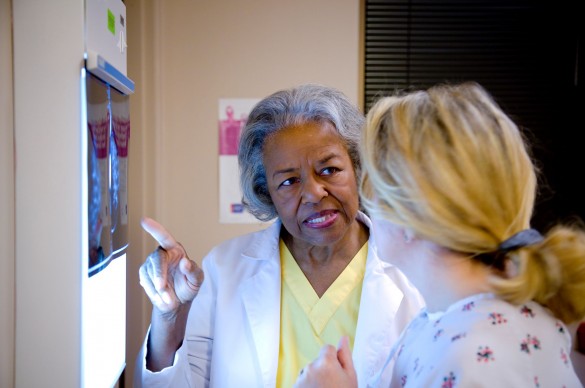Mother's Day is the perfect time to show the women in our lives how much we appreciate them and how thankful we are to have them. What better way to show our mothers, wives, sisters and daughters that we love them than by ensuring all women have access to timely and affordable preventive services. That's why ACS CAN is working this year and every year to fight to increase funding for the lifesaving program known as the National Breast and Cervical Cancer Early Detection Program (NBCCEDP).
The NBCCEDP provides underserved women with access to lifesaving breast and cervical cancer screenings such as mammograms and Pap tests. Since Congress established the program in 1990, it has provided over 12 million screening exams to more than 4.8 million women, detecting nearly 70,000 breast cancers and over 3,700 cervical cancers and saving thousands of lives. While the health care law continues to improve access to health care coverage, including early detection and treatment services for Americans, there are still millions of women that depend on the NBCCEDP for cancer screenings, patient navigation, case management, diagnostic, and follow-up services, particularly women in states that have chosen not to accept federal dollars to increase access to Medicaid coverage.
According to a new ACS CAN/National Colorectal Cancer Roundtable (NCCRT) study, an estimated 2.6 million lower-income women aged 40-64 will remain uninsured and eligible for breast cancer screenings and services through the NBCCEDP in 2017. The study also estimates that 5.7 million women aged 21-64 will remain uninsured next year and be eligible for cervical cancer screenings and services through the program. Uninsured women face significant barriers to accessing lifesaving cancer screenings compared to insured women. Uninsured women are 30 percent less likely than insured women to have had a Pap test in the past three years and about half as likely to have had an annual mammogram. For most uninsured women, the NBCCEDP may be the only way they receive a potentially lifesaving breast or cervical cancer screening exam.
Unfortunately, the administration has proposed cutting the NBCCEDP by 20 percent for fiscal year 2017. ACS CAN urges Congress to reject the president's proposal and instead increase funding for the lifesaving program and match the congressionally-authorized level of $275 million. Failure to achieve adequate funding levels for this program will prevent millions of uninsured, underinsured, and low-income women from accessing screenings that can detect breast and cervical cancers at the earliest, most treatable stages.
ACS CAN is also committed to ensuring that patients have access to lifesaving colorectal cancer screenings. Colorectal cancer is the third most common cause of death from cancer in women in the United States, but is also highly preventable. Thousands of deaths could be avoided each year with routine colorectal cancer screenings. The Colorectal Cancer Control Program (CRCCP) has been an effective evidence-based colorectal cancer screening program since it was established seven years ago. The CRCCP could save more lives if it was expanded to all 50 states, rather than the 24 states, six universities, and one American Indian tribe it currently serves. We urge Congress to fully fund CRCCP at $70 million for this year to help increase the number of Americans who should be screened from the current rate of 65 percent.
Proposed funding cuts to these programs are bad for public health. If Congress and the administration make breast, cervical, and colorectal cancer screenings a priority, we can ensure that all of our mothers, wives, sisters and daughters have access to prevention and early detection services and save countless lives.

